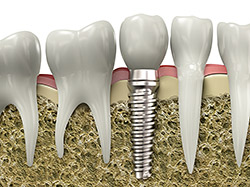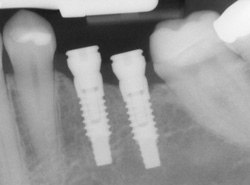People are living longer than ever. While regular brushing, flossing, and checkups enable many of us to maintain our natural smiles for a lifetime, sometimes our teeth just can’t keep up. If you’ve lost a tooth (or a few teeth) due to injury or disease, dental implants can rejuvenate both your smile and your oral health.
An implant is a synthetic tooth root in the shape of a post that is surgically placed into the jawbone. The “root” is usually made of titanium: the same material used in many replacement hips and knees, and a metal well suited to pairing with human bone.
A replacement tooth is then fixed to the post. The tooth can be either permanently attached or removable. Permanent teeth are more stable and feel more like natural teeth.
The ideal candidate for implants is a non-smoker who has good oral health, including a sufficient amount of bone in the jaw, and healthy gums with no sign of gum disease.
Should I get single or multiple Dental Implants?

Implants are versatile. If you are missing only one tooth, an implant plus a replacement tooth will do the trick. If you are missing several teeth in a row, a few strategically placed implants can support a permanent bridge (a set of replacement teeth). If you have lost all your teeth, a full bridge or full denture can be permanently fixed in your mouth with a strategic number of implants.
What are the advantages of Dental Implants over dentures or bridges?
Conventional bridges and dentures are not fixed to the bone, and can therefore be unstable. This can make it difficult to eat or smile with confidence.
Implants not only look more natural, but feel and act more like normal teeth, with a stronger biting force. And because they don’t rely directly on neighboring teeth for support, implants don’t compromise the health of your natural teeth. In fact, bridges are expected to last only seven to ten years, even less with root canals, whereas implants will typically last a lifetime.

What does post-treatment care look like for Dental Implants?
Once your dental implant restoration is completed, it is essential to keep the area clean and infection-free. Dental implants can accumulate plaque and tartar just as teeth can.
Whether you have just one tooth replaced by an implant or several, a professional cleaning schedule will be necessary to keep your implants healthy. The time interval for these professional cleanings will be determined by your individual needs.




 Website Powered by Sesame 24-7™
Website Powered by Sesame 24-7™